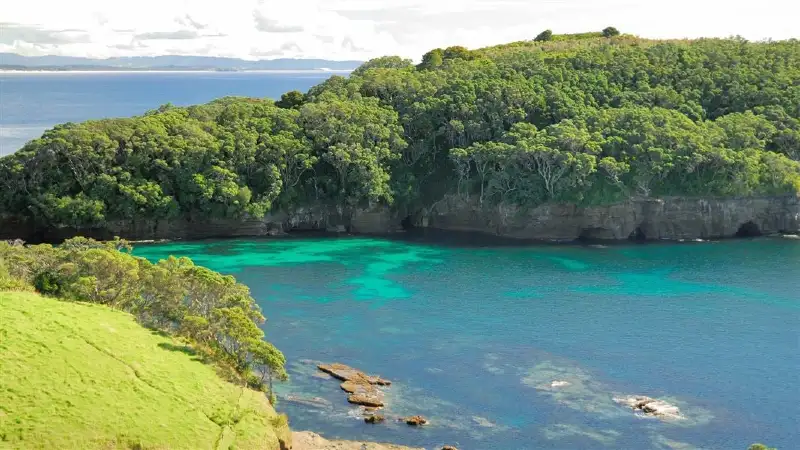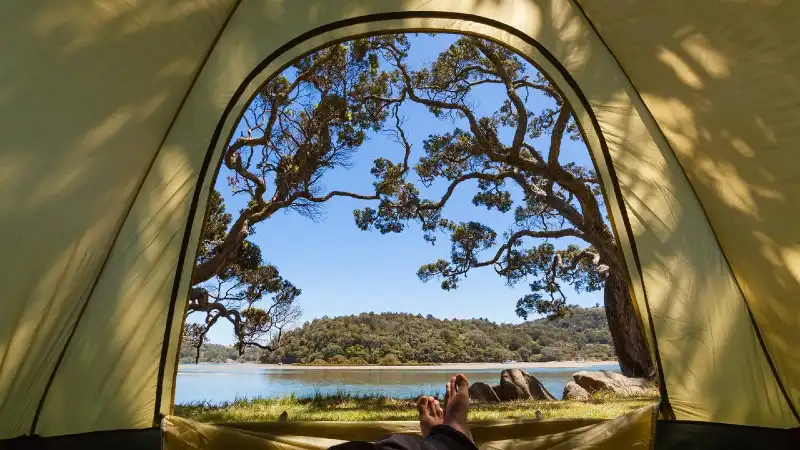Goat Island, New Zealand’s first marine reserve, is not just a haven for marine biodiversity; it is also a vibrant educational hub inspiring the next generation of marine biologists. Located just north of Auckland, Goat Island offers unique hands-on experiences that immerse students in marine ecosystems. Through guided tours, research projects, and community involvement, young aspiring scientists learn about the importance of conservation and the intricate relationships within marine life.
The educational programs at Goat Island are designed to spark curiosity and foster a deep appreciation for New Zealand’s coastal treasures. By engaging with the stunning underwater world, students gain invaluable insights that shape their future careers in marine sciences. For more about the opportunities available, explore Goat Island’s rich offerings at Discover Goat Island.
Understanding Goat Island’s Unique Ecosystem
Goat Island, located off the coast of New Zealand’s North Island, is a marine reserve that serves as a living laboratory for aspiring marine biologists. Its unique ecosystem comprises diverse marine life, including various fish species, seaweed, and coral formations. The reserve’s relatively undisturbed environment allows students and researchers to observe marine biology concepts in action, making it an ideal location for educational opportunities.
The marine reserve was established in 1975, marking a significant step towards conservation and education regarding New Zealand’s coastal ecosystems. The clear waters surrounding Goat Island are home to a variety of marine species, including the iconic snapper and the vibrant blue maomao. Observing these species in their natural habitat teaches students about biodiversity, ecological interactions, and the importance of marine conservation.
For students and educators, Goat Island offers an unparalleled opportunity to engage with marine science in a hands-on manner. Through guided snorkeling trips and educational excursions, participants can witness the impact of human activities on marine environments while learning about the significance of preserving these ecosystems. The Goat Island website provides resources for planning visits and educational programs, making it a vital tool for marine biology education in New Zealand.
Hands-On Learning Experiences
One of the most impactful aspects of educational opportunities at Goat Island is the hands-on learning experiences available to students. These experiences allow learners to engage directly with marine life, fostering a deeper understanding of marine biology principles. For instance, students can participate in snorkeling and diving excursions, where they can observe marine species in their natural habitat.
Programs such as guided beach walks and tide pool explorations offer students the chance to study invertebrates, sea stars, and various algae species up close. These activities not only enhance their scientific knowledge but also inspire a passion for marine conservation. By interacting with marine environments, students develop a sense of stewardship for New Zealand’s coastlines and the creatures that inhabit them.
In addition to fieldwork, Goat Island also offers workshops and seminars led by marine experts. These educational sessions cover topics such as marine ecology, oceanography, and conservation strategies. By learning from professionals in the field, students can gain valuable insights into potential career paths in marine biology. Information about these programs can be found on the Goat Island website, making it easier for educators to integrate these experiences into their curriculum.
The Role of Technology in Marine Education
In today’s digital age, technology plays a crucial role in enhancing educational opportunities for aspiring marine biologists. At Goat Island, technology is integrated into the learning experience to provide students with innovative tools for exploration and research. For example, the use of underwater drones and remote-operated vehicles allows students to capture high-definition footage of marine life without disturbing their natural habitats.
Additionally, educational apps and software can help students identify marine species and understand their ecological roles. Virtual reality experiences can transport students to underwater environments, offering immersive learning experiences that spark interest in marine science. These technological advancements not only make learning more engaging but also equip students with the skills needed for modern marine research.
Furthermore, data collection and analysis software enable students to conduct their research, fostering critical thinking and analytical skills. By utilizing technology in marine education, Goat Island prepares students for future careers in marine biology, equipping them with the necessary tools to study and protect marine ecosystems. For more information about how technology is utilized in educational programs, visit the Goat Island website.
Collaborative Research Opportunities
Collaboration is essential in the field of marine biology, and Goat Island provides numerous opportunities for students to engage in collaborative research projects. By partnering with local universities and research institutions, Goat Island enables students to contribute to ongoing scientific studies while gaining hands-on experience in marine research.
These collaborative projects may include studies on fish populations, the impact of climate change on marine ecosystems, or investigations into the health of coral reefs. By participating in such research, students learn the importance of teamwork and communication in scientific endeavors. Collaboration fosters a sense of community among aspiring marine biologists and encourages the exchange of ideas and knowledge.
Additionally, students can present their research findings at local conferences or community events, helping to raise awareness about marine conservation issues. Such experiences not only enhance their scientific understanding but also build confidence in their abilities as future marine biologists. To explore ongoing research opportunities and partnerships, check the resources available on the Goat Island website.
Promoting Conservation Awareness
Conservation awareness is a vital aspect of marine education at Goat Island. As students learn about marine ecosystems, they also gain insights into the threats these environments face, including pollution, overfishing, and climate change. Goat Island serves as a platform for promoting conservation practices and fostering a sense of responsibility among the next generation of marine biologists.
Through educational programs, students are encouraged to engage in conservation efforts, such as beach clean-ups and habitat restoration projects. These hands-on activities not only contribute to the health of the marine reserve but also instill a sense of pride and accomplishment in participants. By taking an active role in conservation, students become advocates for protecting New Zealand’s unique marine environments.
Moreover, Goat Island collaborates with local conservation organizations to raise awareness about marine issues affecting New Zealand’s coastlines. Workshops and seminars featuring guest speakers from these organizations provide students with valuable insights into real-world conservation challenges. For more information about conservation initiatives and how to get involved, visit the Goat Island website.
Career Pathways in Marine Biology
For students passionate about marine biology, Goat Island serves as an inspiration for potential career pathways in the field. The educational opportunities available at the marine reserve expose students to various aspects of marine science, from research and conservation to education and policy-making. Understanding these pathways is crucial for guiding students as they consider their future careers.
Marine biologists can work in a variety of settings, including research institutions, governmental agencies, non-profit organizations, and educational institutions. Goat Island provides connections to local universities and research facilities, where students can explore internship opportunities or graduate programs in marine science. Additionally, engaging with marine professionals during workshops and seminars can offer valuable networking opportunities.
Students interested in pursuing careers in marine biology should also consider developing a diverse skill set, including analytical skills, communication abilities, and fieldwork experience. By participating in programs at Goat Island, students can build a strong foundation for their future careers. To learn more about career opportunities and educational programs, check out the resources available on the Goat Island website.
Community Engagement and Involvement
Community engagement is a key component of the educational opportunities provided by Goat Island. The marine reserve not only serves as a learning hub for students but also actively involves the local community in marine conservation efforts. By fostering a sense of connection between the community and the marine environment, Goat Island encourages collective responsibility for protecting New Zealand’s coastal ecosystems.
Local schools and community groups are invited to participate in educational programs, workshops, and conservation initiatives. These collaborative efforts create a shared understanding of marine issues and promote sustainable practices among residents. Additionally, community events hosted at Goat Island, such as beach clean-ups and awareness campaigns, provide opportunities for individuals of all ages to get involved.
Engaging the community in marine education also fosters a culture of stewardship, where individuals feel empowered to take action in preserving their local marine environments. By working together, the community can make a significant impact on the health of New Zealand’s coastlines. For information on upcoming community events and engagement opportunities, visit the Goat Island website.
FAQs
What is Goat Island and why is it significant for marine biology education?
Goat Island is New Zealand’s first marine reserve, located north of Auckland. It is significant for marine biology education because it provides a unique, hands-on learning environment where students can observe diverse marine life and ecosystems, making it an ideal location for aspiring marine biologists to study and conduct research.
How does Goat Island inspire students to pursue marine biology?
Goat Island inspires students by offering immersive experiences in a rich marine environment. Through field trips, research projects, and interactions with marine life, students develop a passion for marine sciences and a deeper understanding of ocean conservation, motivating them to pursue careers in marine biology.
What educational programs are available at Goat Island?
Goat Island offers various educational programs, including guided snorkeling tours, hands-on workshops, and research internships. These programs are designed to engage students in marine conservation efforts and provide them with practical skills in marine biology.
Are there any collaborations between Goat Island and educational institutions?
Yes, Goat Island collaborates with several universities and colleges in New Zealand to facilitate research opportunities and educational programs. These partnerships enhance the learning experience by providing students access to expert guidance and resources in marine biology.
How can students get involved with marine conservation efforts at Goat Island?
Students can get involved with marine conservation efforts at Goat Island by participating in volunteer programs, joining local conservation groups, or enrolling in educational courses that focus on marine ecology and wildlife protection. These activities allow them to contribute to preserving the unique marine environment.
What marine life can students expect to study at Goat Island?
Students can expect to study a diverse range of marine life at Goat Island, including fish species, sea urchins, starfish, and kelp forests. The area is known for its biodiversity, providing students with ample opportunities to observe and learn about various marine organisms and their habitats.
What impact does Goat Island have on the future of marine biology in New Zealand?
Goat Island plays a pivotal role in shaping the future of marine biology in New Zealand by fostering a new generation of marine scientists and conservationists. By providing educational opportunities and promoting awareness of marine issues, it encourages students to contribute to sustainable practices and marine conservation efforts in their communities.
References
- Discover Goat Island – This website offers insights into Goat Island’s marine reserve, educational programs, and conservation efforts that inspire future marine biologists.
- Department of Conservation: Goat Island Marine Reserve – The official Department of Conservation site provides information about the marine reserve’s significance and its role in marine education.
- University of Auckland Marine Research – This page details the university’s marine research initiatives, which often include partnerships with local reserves like Goat Island.
- The New Zealand Marine Studies Centre – This organization focuses on marine education and outreach, promoting marine biology through various programs, including those related to Goat Island.
- New Zealand Association for Environmental Education – An organization dedicated to environmental education, providing resources and programs that can inspire young marine biologists, including those focused on marine ecosystems like Goat Island.


